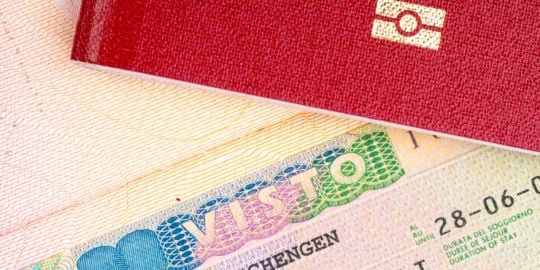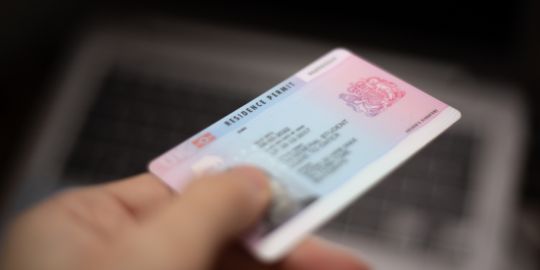Spain
Underwear is meant to be worn underneath clothes. While this sounds obvious and might even sound funny, in Seville, breaking the law has serious consequences. Tired of the gross behavior of some tourists showing their underwear in public, the mayor of Seville has passed a law to forbid wearing only underwear in public. This new law supplements the existing ones, which condemn exhibitionism and violation of people's moral and sexual integrity.
Nonetheless, the Seville City Council wants to end what it considers improper behavior, particularly on the part of tourists. The new rule also targets clothing with sexist messages. The local authorities speak of "anti-social behavior" in public that disrupts others' privacy. Seville is not the only city voicing out. Other cities which are victims of the adverse effects of mass tourism are passing laws to prohibit inappropriate behavior, including a ban on listening to loud music on the beach or playing unauthorized games, a ban on walking around wearing clothing or accessories depicting sexual images or genitals, etc.
United States
Exemption from biometric service fees
As of October 1, it is no longer necessary to pay the biometric service fee to apply to extend or change non-immigrant status (form I-539), as reported by the US Citizenship and Immigration Services (USCIS). This measure concerns all applicants submitting a Form I-539 to extend their stay or change their status to an H-4, L-2 (dependent visa), or E (investor visa). USCIS had already waived biometric service fees for these applicants on September 30.
Initially, the filing fee ($US 370 on average) and the biometric service fee ($US 85) were included in Form I-539. Since October 1 and the fee waiver, applicants no longer have to book an appointment with the biometric services. However, USCIS has the right to request applicants to visit the biometric services and will inform them accordingly.
Only the form will be accepted if ever the $US 85 biometric service fee is sent by mistake in addition to the fee for form I-539 (in two separate mailings). The $US 85 will be refunded to the foreign applicant. However, the whole payment will be rejected as non-compliant if the payment includes both the service fee and the form. If the foreigner mistakenly pays both fees by credit card, USCIS will validate the application but will only charge the filing fee for the I-539 form.
Changes to the H-1B visa
The goal of the US Department of Homeland Security is to streamline the H-1B visa application process. The 3 main objectives of this measure are to facilitate the application process for employers and applicants, to attract more foreign talent, and to combat fraud. The changes will prevent foreign applicants from submitting multiple applications, and every applicant will have an equal chance of being selected. The reform would also discourage employers from recruiting foreigners with a single specific qualification but rather recruit those who have general qualifications.
To recall, the H-1B visa enables employers to recruit foreign talent, especially in the technological and technical fields, and provides them with a residence permit. Approximately 65,000 H-1B visas are issued by the United States every year. To this number must be added 20,000 visas reserved for holders of at least a Master's degree from an American higher education institution. The H-1B visa reform will only take effect once a date has been set.
New Zealand
Residence permits for foreign healthcare workers
Currently, healthcare workers can apply for a residence permit that not only allows them to live, work and study in New Zealand but also to bring their spouse and children up to the age of 24.
The permit is open to any worker who has been employed full-time or permanently for at least 1 year. However, they must have worked in the health sector in New Zealand for at least 2 years prior to their application, and their salary must be equivalent to at least "level 4" or above the minimum wage. Applicants whose spouse and/or children hold a work or student visa must include them in their application for a residence permit. The age limit for applicants is 55, and the permit costs NZ$ 4,290.
Increase in basic salary required for work permits
The average income required to apply for a work permit in New Zealand has increased. This measure, announced by the government, will take effect from February 2024. Currently, the minimum salary taken into account to apply for a work permit is set at NZ$ 29.66 per hour, or approximately NZ$61,683 per year, based on 40 work hours per week. In February 2024, the thresholds will increase to NZ$ 31.61 per hour and NZ$ 65,749 per year.
For New Zealand companies employing foreign workers, this measure represents an additional cost. However, accredited employers (Accredited Employer Work Visas - AEWVs) are attracting more applicants, and their accreditation period has been extended to 5 years. Accredited companies applying for an extension before November will be able to lock in the NZ$29.66 per hour threshold.
New category of resident visa for skilled migrants
New Zealand has also introduced a new visa for skilled migrants. Available since October 9, this visa is based on a simplified points system, where 6 points are required to obtain a residence permit. The new system establishes clear thresholds of skills that foreigners must possess in order to apply for permanent residence. Applicants have several ways to prove their skills. There are three ways of gaining points: working in a skilled occupation and earning at least 1.5 times the average wage in New Zealand, holding a higher education qualification, or being a registered professional (working in a regulated job, holding a professional license, etc.). It should be noted that temporary visas are now available to applicants for skilled migrant visas.
Foreign workers who do not have enough points in these three categories will be able to obtain them by working in New Zealand. However, they must have worked in New Zealand prior to applying for a residence permit. Through the temporary visa system (accredited employer work visa, working holiday visa, etc.), employers can still hire qualified foreign workers.
South Africa
South Africa is revising its list of occupations under pressure. This "List of Essential Professions" identifies the professions designated by the government as essential for the country's growth and development. These occupations are also in high demand. The country currently has a shortage of veterinary surgeons and veterinary nurses; these two professions have been added to the list of essential occupations. Foreigners are now allowed to apply for work visas for these professions.
Mexico
Introduced on October 22, the new visa applies to all travelers flying over Mexico City. They need a visitor's visa regardless of the duration of the transit. With this visa, they are not allowed to work or provide paid services.
There are a few exceptions. The rule applies to all travelers passing through Mexico, regardless of the reason behind their visit: tourism, visiting family, business travel, participation in a sporting or cultural event, or any other unpaid activity.
Canada
The immigration medical examination is no longer a prerequisite
Applicants for permanent residence on the Express Entry visa no longer have to undergo an immigration medical examination (IME) since October 1. Before this date, they were required to undergo the EMI before applying for permanent residence.
However, the measure does not apply to foreigners who have never undergone an EMI. These applicants will have to wait for the recommendations of immigration services (IRCC) when they apply for permanent residence. In fact, the IRCC will send them the necessary information required to take their medical examination.
Foreign nationals who have already undergone a medical examination within the last 5 years and are still in Canada will not be required to have another one to apply for permanent residence. They must bring a copy of their last medical examination or their EMI number. If the most recent medical examination results cannot be used, a new examination will be scheduled.
A new visa for Nova Scotia
The Nova Scotia Provincial Nominee Programme (PNP), a Canadian province, is about to open up to the medical professions. International students will soon be able to immigrate via the PNP to work in paramedical or pharmaceutical fields. For Michelle Thompson, Nova Scotia's Minister of Health, and Brian Wong, the province's Minister of Advanced Education, the aim is to relax the "International Diplomas in Demand" branch of its PNP. The PNP enables regional governments to welcome foreign candidates working in sectors beneficial to the local economy. These foreign workers are eligible for permanent residence.
Nova Scotia's PNP exemption covers Nursing assistants, health care assistants, early childhood educators, paramedics, pharmacy technicians, etc. To be eligible, candidates must have a full-time job offer and possess the necessary qualifications. They must also have achieved level 5 of the Canadian Language Benchmark. Only foreign workers between the ages of 21 and 55 can apply.
Doubling tuition fees for students outside Quebec
The announcement, made in mid-October, is still not well received. The Quebec government will no longer subsidize Canadian students who enroll in English-language universities. According to Pascale Déry, the province's Minister of Higher Education, tuition fees for a Canadian attending a Quebec university are CA$ 8,992. With the reform, they will increase to about CA$ 17,000. Tuition fees for international students will increase to about CA$ 20,000.
The measure will allow the government to raise about 110 million euros annually. The money will be used to fund French-speaking universities in Quebec. Exemptions are provided to international students outside the province who have already begun their studies in Quebec, those who came under bilateral agreements (France, Belgium, etc.), or students outside the province following postgraduate programs.
In Quebec, the issue of preserving French over English is an old battle. Interviewed by Radio-Canada in August 2022, the Official Languages Minister, Ginette Petitpas Taylor acknowledged that "the French language is threatened in Canada, including in Quebec". For Jean-François Roberge, the current Minister for the French Language, the measure will allow the preservation and promotion of the French language, especially in Montreal. He points to an "escalating anglicization", with many people coming to Montreal without speaking French. But heads of English-language universities warn that the law will be "detrimental" to the French language.
United Kingdom
Expatriates in the UK should expect a rise in the health tax. It goes hand in hand with the 15% increase in visa fees, which has been in place since October 4. This surcharge, known as the Immigration Health Surcharge (IHS), allows foreigners to access NHS (National Health Service) healthcare during their stay. It applies to anyone staying, working or studying in the UK for at least 6 months. The surcharge is payable during the immigration procedure.
Although a discount is provided to international students and children (who usually pay less than working people), it is still a burden for foreigners. The new increase will raise the surcharge from £624 to £1,035 per year, a rise of around 66%. The surcharge for a child will rise from £470 to £776 per year. There are also limited exemptions for asylum seekers.
Unlike visa fees, the IHS increase will require approval from both Houses of Parliament before it is applied. If approved, the new surcharge will come into effect from January 2024. This will have a significant impact on expatriates' finances. Employers will also be affected and might have to reconsider their plans for recruiting foreign workers, which is precisely the government's aim.
Sweden
Sweden continues to tighten its immigration policy. Since November 1, foreign workers must earn at least €2,900 to qualify for a work permit. Under the new law, expatriate workers must earn at least 80% of the average wage in Sweden, set at €3,614 in July 2023. However, the amount varies between different industries.
The Ministry of Justice argues that the measure is essential to combat fraud and reduce the number of low-skilled expatriates. According to the Ministry, many low-skilled jobs can be filled by workers who are already in Sweden. The Ministry also claims that social justice is essential and guarantees that its measure will make it possible to combat the exploitation of foreign workers. The change is part of a broader policy aimed at reducing the number of immigrants and is backed by the Far East. The government claims that the recent change will not affect immigrant workers from the European Union (EU) or non-EU seasonal workers.
Saudi Arabia
New rules have been introduced for expats who hire housekeepers. Musaned, attached to the Ministry of Human Resources and Social Development (MHRSD), has decreed that expatriates will no longer be able to hire housekeepers of the same nationality as themselves. However, expatriates can still hire housekeepers of a different nationality. Likewise, they must be able to justify the financial resources required for the visa procedure.
Expatriates applying for a recruitment visa for the first time must demonstrate that they earn at least 10,000 Saudi riyals monthly (US$ 2,665) and provide proof of financial stability (bank funds of at least 100,000 Saudi riyals, i.e., approximately US$ 26,657). They must earn twice as much for a second application for a recruitment visa, i.e., 20,000 Saudi riyals per month and 200,000 Saudi riyals in funds, i.e., approximately US$ 5,331 and US$ 53,314.
Please note that proof of financial stability must be validated by an official certificate from the General Organisation of Social Insurance (GOSI). The certificate must be sent within 60 days of the visa application date.
United Arab Emirates (UAE)
Sensitizing expats on the rules in force in the UAE
On October 10, the Ministry of Human Resources and Emiratisation (MoHRE) and the Federal Authority for Identity, Citizenship, Customs and Port Security (ICP) launched an awareness campaign for expats, scheduled for 3 months. The campaign focuses on violations concerning tourist visas, work visas and employment visas. Unfortunately, expatriates are not always aware of the rules in place concerning changes of status and the need to update their situation. The Emirati authorities' campaign serves as a reminder that expatriate workers and foreign tourists must always update their visa status as soon as their existing expires. They can either change their visa or leave the UAE.
The campaign, which will be available in Arabic, Swahili, Urdu and English, will also address the provisions of the new labor law, which took effect last year. According to Khalil Al Khoori, MoHRE's Undersecretary for Human Resources Affairs, the campaign will remind and/or inform expatriates of their rights, duties and possible penalties for breaching the rules in force. The authorities also want to emphasize labor laws in order to facilitate the integration of expats.
Travelling without passport or visa: the future in Dubai
Have you ever thought of traveling to Dubai without a passport or visa? This could soon be possible by biometrics. To make life easier for its residents, Dubai might soon allow entry without the hassle of administrative procedures, including passports and visas. The announcement was made on October 16 by Emaratech, a leading technology company.
Emaratech, which is owned by the Dubai Investment Company, promises changes "in the near future". The project is supported by Dubai's General Directorate of Residence and Foreign Affairs, Emirates Airlines and Dubai Airport. Through the use of biometrics, passengers will go through a simplified check-in process after their biometric data has been captured. Checking in their baggage will also be more straightforward. Much of this technology will be based on facial recognition. Coupled with biometrics, it will act as a means of identification, enabling passengers to pass through the various security stages.
Supporters of the project claim that entry at the Dubai airport will be much easier, provided, of course, there are no incidents (concerning the person's identity, criminal record, etc.). Last year, biometric check-in and facial recognition were tested in Abu Dhabi.
France
Visas suspension for citizens from Burkina Faso, Mali and Niger
Paris has suspended visas to Burkina Faso, Mali and Niger. The crisis between Paris and the military juntas of these 3 African states is hindering the projects of students from Burkina Faso, Mali and Niger. France has classified the capitals of these three countries as "red zones", and traveling there is now strongly discouraged. Previously, the capitals were exempt from strict security measures.
The students affected are disappointed and worried about their future. They can still follow online courses, a meager consolation compared to face-to-face classes. There are few official figures for these aggrieved students. The Conseil des Nigériens de France (CONIF) estimates that 380 students are stranded in Nigeria. Researchers, artists and other professionals are also affected by the visa suspension.
Foreign Affairs Minister Catherine Colonna reassures this measure does not apply to students already in France. But she recalls the importance of protecting local staff, as French embassies are currently operating "on a shoestring". Meanwhile, those concerned feel let down by the French government and have little hope for improvement now that the new school year has begun.
Reform of the Revenu de solidarité active (RSA)
Intended for people with little or no income, the RSA is based on household composition and residence: you have to reside in France to qualify. Expatriates returning to France may, therefore, be eligible but will have to wait until the first day of their 4th month of residence in France.
Currently, it is not necessary to be employed to receive the RSA. However, France wants to improve the professional integration of RSA recipients. A report by the Cour des Comptes in 2022 revealed that 17% of RSA recipients had no follow-up. Seven years after receiving the RSA, barely 34% of people are in full employment, and only a third have a stable job. In June 2023, the government presented its bill "for full employment". To benefit from it, people must prove that they worked 15 hours weekly. Those affected have mixed feelings about this measure. Some fear they will be forced to do jobs outside their field of expertise, as the law provides for penalties. Others believe that the measure equates beneficiaries with people who voluntarily decide to remain in a precarious situation. On October 23, MPs and Senators, meeting in a joint committee, reached an agreement on the bill, including the controversial measure.
Belgium
The Belgian region of Wallonia has updated its list of skills shortages. The current list is valid from October 1, 2023, to September 30, 2024, but it is subject to change at any time, depending on the economic situation. Butchers, bakers, sales managers and site managers are still needed in Wallonia. Some occupations, such as cooks, glassmakers and credit analysts, have been removed from the list. There are still 68 occupations on the list.
Denmark
Denmark has published an updated version of its Positive List for People with a Degree. The new list, effective since October 1, is based on recommendations from the Regional Labour Market Board. The Positive List identifies skilled occupations that are currently in short supply. Foreign candidates applying for these occupations will be able to apply for residence and work permits in Denmark. To be eligible, foreigners will need to have completed the appropriate training. The new Positive List remains effective until September 30, 2025. Please note that there is another Positive List. It is updated twice a year and focuses on skilled jobs.
Italy
Italy's Immigration Plan decree is now effective. The "2023-2025 Programme for the legal entry of foreign workers into Italy" was presented on September 27. The decree, also known as the "Flussi quota", was published on October 3 in the Official Journal and plans to issue 452,000 permits allowing non-EU foreigners to enter and work in Italy between this year and 2025. This represents a significant change in strategy, as the previous decree issued these permits annually. It also marks a further increase in the quota of foreign workers. While the decree issued 82,705 entries in 2022, this figure will rise to 136,000 this year, 151,000 next year and 165,000 in 2025.
Most of the 2023 quotas are allocated to seasonal jobs in agriculture, tourism and care (82,550 foreign workers). However, these quotas are available only to a few nationalities. Non-seasonal jobs, such as clerical work, account for the second largest number of quotas (52,770). Nine thousand five hundred quotas are reserved for people working in family care; 500 are for entrepreneurs (self-employed, investors, artists, etc.). The remaining 4,000 quotas are allocated to seasonal foreign workers wishing to convert their permit into a standard work permit.
Japan
To address the severe labor shortages in the transport sector, Transport Minister Tetsuo Saito is considering adding a driving license to the skills required to work in certain professions. This new skill would be added to the Specialised Skilled Foreign Workers Programme. According to the Minister, as Japan gradually reopens to tourism, the transport offer must follow, both for locals and tourists. In this perspective, the Japanese government is considering including taxi or lorry driving in the list of specific skills that enable a foreigner to obtain a long-term residence permit in Japan. The government has set a deadline until the end of the 2023 tax year (March 2024; the Japanese fiscal year ends in March).
Malta
Malta intends to reduce the number of foreign workers and keep only the most qualified in the sectors where they are in demand. Prime Minister Robert Abela emphasizes this message to make people forget the scandals that have affected his party. Abela also says he understands particular concerns about the increase in the number of expatriate workers. The nationalist party has long been critical of Labour's vision, claiming that the government is relying on "importing foreign workers" to sustain the country's economy.
Some fear that we are becoming populist. While they claim that the number of expatriates has increased 5-fold in 10 years (with 1/3 Europeans and many Britons), they also claim that these figures are the result of a proactive policy by the Maltese Labour government launched in 2013. This policy is based in particular on tax incentives to attract foreign companies, recover from the 2008 crisis, and face the aging population. Foreigners have contributed to Malta's economic and demographic growth. However, the archipelago has become too small compared to the high population density, especially in the big cities. The number of foreigners has increased from 20,000 in 2011 to more than 115,000 in 2021. However, the General Secretary of the General Workers' Union, Josef Bugeja, points out that the Maltese economy would collapse without foreign workers.
Germany
The first 3 stages of the immigration law reform begin in November. The reform, which was passed in July, will be effective from November 2023, March 2024 and June 2024. These 3 stages all have the same objective: to make it easier for non-European foreign workers to immigrate to Germany, to be more flexible to workers with non-academic vocational training and qualified foreigners with a university degree.
The reform will also make it easier for foreigners to obtain a visa. German bureaucracy is regularly criticized for being slow and complex, and it is currently planning a significant overhaul. In January 2023, Federal Foreign Minister Annalena Baerbock announced her intention to speed up the digitization process to modernize the visa system. The government has opted for a points-based system focusing on qualifications and professional experience. The immigration law reform is taking place against a backdrop of labor shortages. According to the German Employment Research Institute, there were 1.74 million job vacancies in Germany in 2022. The law aims to attract 60,000 non-European workers each year.
Malaysia
2,000 foreign workers to support tourism
The Ministry of Home Affairs has announced the recruitment of 2,000 foreign workers to support the tourism and cultural sector in response to a request from the Ministry of Tourism, Arts and Culture. This measure is part of the vast plan initiated by Prime Minister Datuk Seri Anwar Ibrahim, who intends to make 2026 "the year of Malaysia". The initiative "Visit Malaysia Year 2026" has been designed to boost the tourism industry. The country expects to welcome at least 26.1 million tourists in 2026.
In practice, these 2,000 foreign workers will be working in the theme parks facing a "critical" labor need. There are currently 13,000 people employed in Malaysia's 78 theme parks. The 2,000 additional workers will support the forces behind the "Visit Malaysia Year" initiative. For now, there are only vacancies for assistant operators and assistant theme park wardens. Recruitment of 2,000 foreign workers will begin in 2024 and will continue in 2025.
The government has also responded to calls from hairdressers, goldsmiths and textile shops, who can now recruit foreign workers, subject to a quota of 7,500.
Too many foreign workers in factories and services sector
According to the Home Affairs Minister Datuk Seri Saifuddin Nasution, there are too many foreign workers in the factories and services sector. The relaxation of the immigration rules and the recalibration program have led to a surplus of more than 250,000 foreign workers in manufacturing and services. As of October 9, the government reported 667,418 foreign workers, while its recalibration program estimated 518,000. While the services sector was expected to employ 20,000 workers, this industry currently employs a little over 142,000 workers. The factories were supposed to employ 50,000 workers, but the figure has now reached 197,213.
Contrary to popular belief, sectors like agriculture, plantation and construction continue to face labor shortages. While the recalibration program estimated the employment of 301,000 foreign workers, only 220,230 have been recruited. In agriculture, 53,648 foreign workers were hired instead of the expected 90,000. There was a slight improvement in the plantation sector, with 52,123 foreign workers instead of the 57,000 expected. According to the government, there are around 1.7 million foreign workers in Indonesia. According to the Economic Planning Unit, the number of foreign workers should be at most 2.4 million by 2025.
















